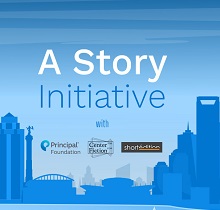Lola unbungees her violin case from the back of her bike. She removes the lacquered instrument and props her sign in its velvet mouth: MUSIC STUDENT, DONATIONS GRATEFULLY ACCEPTED. Crooking her neck to the violin's chinrest she plucks each string, nudges its pegs into perfect tune. Now Lola touches her bow's soft horsehair to the taut gut and draws a high, mournful note into the atmosphere over the intersection between four old, brick high-rises. Their street level corners contain a chili parlor, a bank, a pharmacy, and a dry cleaner. The autumn air is a stew of stop-and-start exhaust, of fryer oil and wet cigar, of chemicals, hotdogs, pennies, and spice. Between the buildings, Bach blends with traffic's bleat and squeal, with the bassy throb of a car stereo.
The droves of office workers largely ignore Lola as they move hungrily toward the chili parlor door. A few passersby drop change into her case. Eyes closed, her senses tune in to small dramas. There's the wingburst of pigeons startled by a falcon calling overhead. A woman on her cellphone: I'm so tired of your excuses every single time alimony's due. Convivial bankers on their way to lunch: so I told Bob where he can go stick it . . . in a variable rate annuity.
Skateboard wheels tick to a stop before her violin case. She opens her eyes to find a boy with obsidian hair, hazel eyes, holding a goblet-shaped drum.
Mind if I join you? he asks.
She nods mid-arpeggio.
His quick rhythm hangs rungs in the helix of her melody. Their duet attracts a steady clink of coin, the rustle of dropped banknotes.
When she looks up, her case is almost full. Sitting on his skateboard, the boy strikes his drum's low-toned center and its bell-like rim. He fills with trills and rolls.
They take a break. Lola begins to gather the money.
Khaled is short on rent again. He hasn't been getting enough shifts at the market stall where he stocks fruits and vegetables. Now rent's due and his checking account has dwindled. So he grabs his drum and skateboards downtown.
The city is a crystal garden, wealth solidified in towering mineral form. Like if he had a hammer and chisel he could chip off just enough to pay his landlord. The smell of money is everywhere. It wafts into alleys from kitchen doors. It crackles in wires overhead, buzzes on waves through the air. Everywhere there is money and the absence of money. His gut growls. He's no hunter, Khaled. He's a filter, a fisher, casting out a seine of rhythm. Trick is, don't let the hasslers get to you. Last time some random dude told him to go back where he came from, and stared him down until he moved on. Khaled wishes he'd held his ground.
Now he hears the violin, and follows its undulating strains to find the musician playing, her hair an iridescent blue.
When he asks if he can join her, he can't tell whether she nods or simply sways, but something in her look invites him in. He sits and begins to improvise an accompaniment.
When they take a break, the girl rests her violin on its case. She collects the money and asks, What sort of drum is that?
It's called a darbuka. Or doumbek. And other names, depending where you are. It's played in Egypt, across the Middle East, Africa and Asia.
Do you play on the street often?
Sometimes. I stock produce up at the outdoor market.
I'm a student at the conservatory. Your percussion is beautiful. Let's share this fifty-fifty.
He hesitates. You were here first. And your music is so professional.
She laughs. Splitsies, she says. I'm Lola.
Khaled. He bumps her fist. She begins to count the money.
The grab is so quick that neither of them reacts until the thief's electric scooter is halfway down the block. One moment, it lies on the open case. Next it flies in the grip of a kid who buzzed them, stooped, and snatched her violin.
Khaled takes off in pursuit, dodging cars. He's played soccer since he was three and while the scooter is fast, his own acceleration is fierce. He hurdles and twists and shortcuts after the rider. Sprints all-out on a straight stretch, closing. The thief looks back and Khaled clocks a familiar desperation.
They cross over the highway into an older neighborhood. The thief corners down an alley, almost wipes out, barely keeps the violin. Khaled is that close to snagging it when the thief accelerates on a downward grade. The air sears Khaled's lungs. His thighs ache. Still he runs, the fastest version of the simplest, most basic rhythm to which his heart plays doublets, a burning in his core.
But it's not enough. It's gone.
Gasping, choking, bent, he begins the slow walk back to the corner. Lola, her case, and bike are gone. So is his drum. Only his skateboard leans against the chili parlor wall.
At five a.m., the trucks back beeping against the loading dock. Khaled likes the cool quiet before dawn, the sweet ripe scents of fruit. He dollies crates of peaches, pears, citrus, greens, potatoes, tomatoes, and melons. He piles fruit in pyramids, turns rinds to hide stems and blemishes. But his belly is a knot of worry. Rent is overdue, and this morning's pay won't be enough. He dreads the conversation with his landlord. And now even his drum is gone.
There you are, says Lola, materializing out of the smoked, rose quartz of city morning. I brought your drum—I couldn't just leave it. And here's your cut. He marvels at the cash and carefully folds it. Sorry about your violin, he says. She shakes her head, shrugs. I looked in all the pawn shops, but no luck, she says. That's where I found another, cheap. She smiles. Now I'm seriously broke. So I was wondering. Would you join me on the corner again? I could use your help. If you're down?
Of course he will.
As the day warms, the world seems to Khaled a great flow of light and sound and wonder. He feels its beating heart.



